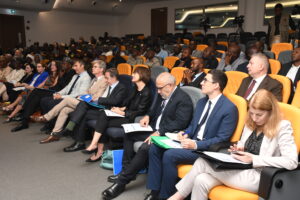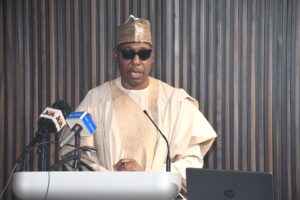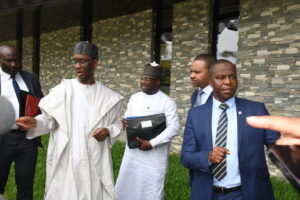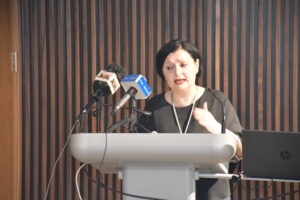By Abu Michael, PSO Strategic Communication, NCTC
Peace and the tranquil environs of the northeast of Nigeria eluded with the activities of non-state armed groups heaping grave consequences on the socioeconomic activities of encompassing states of especially Adamawa, Borno and Yobe since the rise of non-state armed groups in 2009.
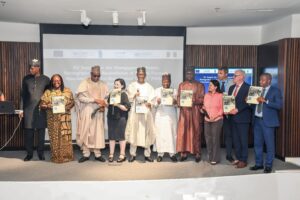
Babagana Zulum (3rd Left); EU Head of Delegation to Nigeria and ECOWAS, Amb. Samula Isopi (4th Left), National Security Adviser, Mallam Nuhu Ribadu (5th Left); National Coordinator, National Counter Terrorism Centre, ONSA, Retired Rear Admiral Yaminu Musa Ph.D (right) and other dignitaries at the launch of SD3R Project for the North East Nigeria in Abuja
The Bola Ahmed Tinubu-led Federal Government through the Office of the National Security Adviser (ONSA) is impudently taking on the issues attempting to jeopardize national security and unity headlong with the use of both kinetic and non-kinetic approaches.
In collaboration with domestic and international organizations including state governments, ONSA’s National Counter Terrorism Centre (NCTC) is lopping terrorism, violent extremism and basing peace for the stability of not just the northeastern areas, but also promoting the ideals of social justice across the country through non-kinetic approach.
To further boost the efforts of the NCTC and its partners towards achieving peace and stability for sustainable development, the National Security Adviser (NSA), Mallam Nuhu Ribadu on behalf of the Nigerian Government recently launched the European Union (EU) Support for the Disengagement, Review, Reintegration and Reconciliation (SD3R) project for persons formerly associated with Non-State Armed Groups (NSAGs) in the North East Nigeria.
In his speech, the NSA pledged that ONSA would always ensure effective coordination as enshrined in the Terrorism Prevention and Prohibition Act 2022, Policy Framework and National Action Plan for Preventing and Countering Violent Extremism and other relevant policy documents. Mallam Ribadu also pledged the sheer commitment of the Federal Government to the promotion of non-kinetic approach towards addressing terrorism and violent extremism.
He said the establishment of NCTC and other efforts demonstrated the genuine commitment of the Nigerian Government to sufficiently address terrorism and violent extremism adding that its continued support to NCTC and its partners was to enhance robust security, successful reintegration of persons formally associated with non-state armed groups, and increase capacities for promotion of social justice in the country.
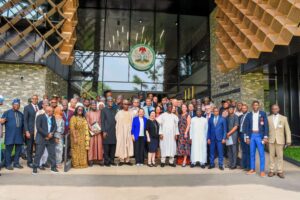
National Security Adviser, Mallam Nuhu Ribadu (8th Right), National Coordinator, NCTC-ONSA, Retired Rear Admiral Yaminu Musa, PhD (5th right); Gov. Babagana Zulum of Borno State (8th Left); Representatives of the EU Delegation to Nigeria and ECOWAS; Ambassadors of Various Countries and other High level Dignitaries in a group photograph after the launch of SD3R Project for North East Nigeria in Abuja, on Thursday, March 14, 2024
While thanking the EU and the consortium of the UN agencies (International Organization for Migration, United Nations Office on Drugs and Crime, UNDP and UNICEF) for providing funds for the implementation of the EU SD3R project in Adamawa, Borno and Yobe States, he commended the National Coordinator of NCTC, Rear Admiral YEM Musa (rtd) for his tact and commitment to issues of national security.
In his vote of thanks, Admiral Musa noted that the EU SD3R project reflected 3 major lines of efforts with an assurance that victims would also get justice as he explained the importance of non-kinetic approach in addressing matters of terrorism and violent extremism.
He mentioned that an all-encompassing committee would be constituted for the implementation of the project with serious emphasis on monitoring and evaluation in order to ensure transparency and accountability. He reiterated the success story so far recorded with the Borno State model because of Governor Babagana Umara Zulum’s passion for the use of non-kinetic approach in the prosecution of the war against terrorism and violent extremism, as well as acknowledge the support and commitment of Governor Ahmadu Umaru Fintiri of Adamawa State; and that of Yobe State, Governor Mai Mala Buni. He pointed out that it was important for people to work in unison with the government for the realization of any meaningful results.
The NCTC National Coordinator then expressed deep appreciation to the NSA for his commitment to the use of both kinetic and non-kinetic approaches including other inclusive means in tackling insecurity in the country. He thanked the EU and the consortium of UN agencies for their genuine support and for providing funds for the projects including the ambassadors of various countries and other diplomats who demonstrated that support by their presence.
Borno State Governor, and Chairman, Northeast Governors’ Forum, Prof. Babagana Zulum commended ONSA for supporting the non-kinetic approach in addressing the security challenges affecting the northeastern states of the country, noting that the Borno State approach incorporated various aspects including social and economic dimensions. He pledged his political will and commitment and those of his Adamawa and Yobe counterparts to the EU SD3R project.
Speaking in the same vein, Ambassador Samuela Isopi of the EU reechoed the much that could be achieved through healings and reconciliation in the northeast sub region if all parties worked together and leverage on their expertise. Ambassador Isopi said EU was glad to support the initiative with the hope of promoting peace, building bridges of unity and mending broken hearts.
According to her, the project formed part of the broader EU commitment to the Lake Chad region which amounted to 2.5billion Euros since 2014, appreciating the support of the consortium of the 4 UN agencies to the project.
In his remarks, the Chief of Mission, International Organization for Migration, Laurent M. J. Boeck expressed joy for witnessing the launch of the project which he described as the signature for a pragmatic action towards dealing with terrorism and violent extremism in the northeastern part of Nigeria. He commended the governors of the 3 states in which the project would be implemented and pledged the continuous support of the IOM. According to him, peace is an indispensable ingredient for development, noting that the project is transformative, and he urged all stakeholders to work together for the success of the initiative.


